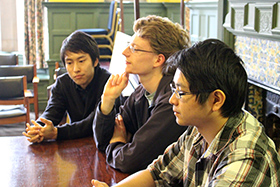English⁄Japanese
Values in Student Lives
Values in Student Lives; A Comparison of Oxford University and Kyoto University
On 4th April 2014, five assistant students from the University of Oxford and seven attendees of the programme from Kyoto University held a discussion on several topics relating to university students life. Here is the summary of the discussion.
1) The reason why you chose your university/college for your education
Oxford students tended to choose their university mainly for two reasons: one was because it is one of the best universities, and the other was due to family connection. Many of the students regarded Oxford University as more suitable in order to study their specialties or courses than Cambridge University. One student said that he preferred the teaching style, namely the tutorial system, in Oxford University. Some of them answered that they felt their parents’ pressure to go to the best university. Meanwhile, the reasons for selecting their colleges sounded more casual: due to convenience or because of the easiness to get in.
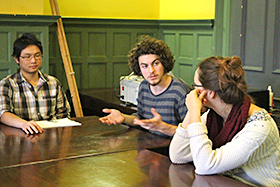
Kyoto University students tended to choose their university for two reasons: since it is one of the best universities, and because of a characteristic of Kyoto University, which is ‘freedom’. They stated that Kyoto University had a long history and it was the centre of the study in their fields. In other words, they could study under appropriate specialists or supervisors. Some students also pointed that the characteristic of Kyoto University was better for them to study.
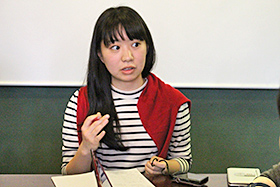
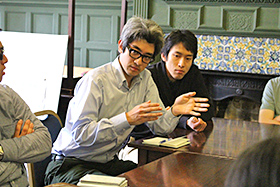
Overall, both university students think that their universities are the best place to study their own topics. The different features between the two universities are that Oxford University students are affected by their family members when they select the university, while Kyoto University students chose Kyoto University because of its atmosphere, freedom.
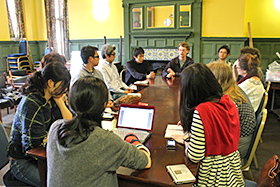
2) What you want to learn the most in universities; what you are doing for your research
All the students of both Oxford University and Kyoto University answered that what they want to learn the most in their university was their specialisations. Their specialisations ranged from humanities to natural science and were quite diverse.
[Ideas from the Students of Oxford University]
A student, who studies mathematics at Oxford, said that studying math itself was interesting and gave him a chance to open his eyes even though he had not decided yet to be a researcher or to work at a church in the future. Another student, who wants to develop old faculties through her study, was interested in German literature. She thinks that attending tutorials supplies her with a good opportunity to learn a lot (tutorial is one of the traditional systems at Universities in the UK). Another student, who belongs to the faculty of literature, loves reading and she concentrates on medieval papers at the moment. Another speaker from the same faculty believes that understanding with each other can make the world better for everyone, so communicating through language is important for him to achieve it. A senior student has been learning classics and the art archaeology in Hellenism - the movement of Greek across the Mediterranean - knowledge about which he thinks can enrich his entire life.
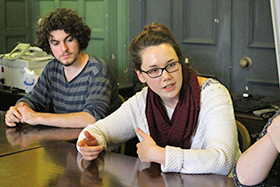
[Ideas of Students from Kyoto University]
One of the Kyoto University students, majoring medieval Russian history answered that his research was focusing on making a comparison between Russian culture and that of Japanese. One from Sisyu-kan (Graduate School of Advanced Leadership Studies, Kyoto University) said that he wanted to deepen his specialisation such as economic relations between foreign countries and world economic growth. Another student researches how people reconstruct their livelihood in post-conflict situation in Africa.
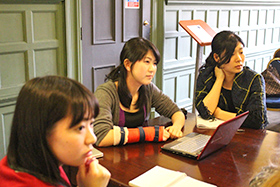
3) Comparison between learning styles of each university
There are various personal or general styles of learning both in the UK and in Japan. In Oxford University, learning which is related to the humanities is almost independently done. That is to say, reading primary resources in a list by oneself consists of most part of their research. As a result, self-discipline and time-management play an important role. Moreover, this style does not necessarily require attendance at lectures, which are namely optional. Instead, there is a great emphasis on a study dependent on tutors.
Meanwhile, Japanese universities have a similar learning style as well. For example, in the humanities, it is natural that the study is based on reading original texts and articles written in foreign languages. The same is true in the natural sciences in order to learn useful theories and practical skills for experiments. However, it is possible to point out that learning method in the natural sciences is usually ‘nomothetic’, whereas that of the social sciences is ‘idiographic’ in a sense that they focus not on diversities but on models.
Overall, it could be argued that the learning styles are roughly the same in Oxford University and in Kyoto University. As can be seen from above, there are also differences to a certain extent, but these might be attributed to the difference between specialisations. Therefore, the type of specialisation determines the similarities and differences regardless of universities.
4) Important things for student life
As regards this question, a clear distinction could be seen between two universities in terms of balancing in student’s study and private life. For instance, spending time for part time jobs is basically forbidden with some rare exceptions for students of Oxford University. If students would try to work in their spare time they must request special permission to their tutor. Moreover, there is a strict limitation in working hours. On the contrary, in Kyoto University, some practical knowledge of part time jobs could be considered as valuable and indispensable experience, which enrich student’s life and affect their course of decision in job hunting afterwards. In addition, participations in social activities such as volunteering, inter-college projects and club activities are very welcomed as a way of spending time for students from Kyoto University.
It is needless to say that the importance of time management and self-discipline is highly recommended in both universities. However, it is obvious that the Oxford’s style is more systematic to direct students to concentrate on studying. The difference could be resulted from the fact that every student in Oxford is basically a member of a college, which is the place for both study and living. Under such condition, it is easier for tutors to give advice to students by means of both academic and private. For example, two of the assistants for our programme mentioned that when they became a member of the college they were advised by their tutors to divide a day into three parts, which has eight hours each and each devoted to study, private and sleep respectively. We may find this as a particular characteristic of Oxford style of education that stems from the college system, which is very special even in the UK as a whole. Furthermore, in terms of concentrating on study rather than other aspects of student’s life in Oxford, it is possible to conclude that one reason of doing so presumably results from the length of the academic years to obtain a bachelor degree. That is to say, in the UK, although it depends on fields of study, a bachelor degree can be completed within three years, which is generally one year shorter than in Japan; and this fact drives its system to require students to focus on study.
Other dissimilarity could be found in the attitude of adjusting to the increasingly globalising world. Kyoto University is willing to send more students abroad for the sake of internationalising the university and creating people who is able to contribute to international cooperation, for instance. Therefore, the university is trying to offer varieties of programmes to students. On the other hand, such international programme is not often seen in Oxford except genuinely necessary filed trips in some academic area, such as cultural anthropology and some biology, which is necessary to capture certain species, for example. Oxford University seems to put emphasis on studying in their own regular academic courses without introducing new programmes.
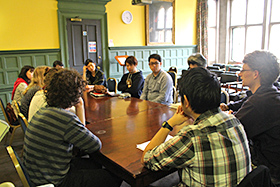
5) Prospects for contribution to society in the future
Regarding this question, there seemed to be as many answers as the number of people, and this would be applicable no matter what nationalities we have.
Some students from Oxford University said that working for our own enjoyment might be beyond any career plans and lofty purposes, and that it would be marvellous if their enjoyable works possibly make some contributions to society even if those contributions were not given the highest priority. They gave some examples of these jobs such as vocations, musicians, etc. Their opinions are, therefore, converged to the point that the first thing we choose is whether their occupations are attractive for themselves, followed by the extent to which their works can contribute to society.
On the other hand, it seemed that students from Kyoto University had their clearer career visions in terms of contribution to society. They might recognise that their works are important not only for their own satisfaction but also for society itself. In other words, it is recommended that their occupations be well-balanced between what they would like to do and the extent to which it can give positive impacts on society. In this point, some students from both universities exemplified some of the appropriate works such as domestic and international civil servants or volunteers while one provided another perspective that such a way of thinking sometimes comes from their arrogance to others.
Of course, there are not any definite answers for this kind of discussion, but we could gain a great deal - for example, other perspectives and ways of thinking - through this enthusiastic discussion with students from both universities and the discussion can definitely promote our relation between universities and mutual understanding on each other.
As a conclusion, it seems true that students from both universities basically share their methods of study as well as their expectation to the universities. Meanwhile, the prospects that the students from each university had differs from each other to a certain extent. Moreover, it was interesting to find that the students from Oxford University do not necessarily support all the tradition for which their university is famous, while the students from Kyoto university were all supportive of the ‘freedom’ that our university have been offering us. It would be fair to add that many of the students in this programme exchanged their opinions on a great range of topics on everyday basis, which made the programme much more amusing and intriguing.
( Text by Rieko KITAMURA, Jun TAKAHASHI, Nobuko YAMAZAKI, Dai YAMAWAKI, Yuya OIKAWA, Yuji YAMAGISHI, Sena NUKATA )
